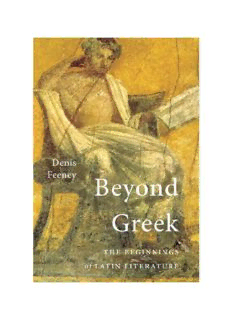
Beyond Greek: The Beginnings of Latin Literature PDF
Preview Beyond Greek: The Beginnings of Latin Literature
Beyond Greek Beyond Greek } the beginnings of latin literature Denis Feeney Harvard University Press cambridge, Massachusetts london, england 2016 Copyright © 2016 by the President and Fellows of Harvard College All rights reserved Printed in the United States of America First printing Library of Congress Cataloging- in- Publication Data Feeney, D. C., author. Beyond Greek : the beginnings of Latin Literature / Denis Feeney. pages cm Includes bibliographical references and indexes. ISBN 978-0-674-05523-0 (alk. paper) 1. Latin literature— Greek infl uences. 2. Greek language— Infl uence on Latin. 3. Comparative literature— Greek and Latin. 4. Comparative literature— Latin and Greek. I. Title. PA3010.F55 2016 870.9'001— dc23 2015005784 For the team— Clare, Michael, Susan, James, Margaret, and Peter Contents Preface ix Introduction 1 1 Translation: Languages, Scripts, Texts 17 2 Th e Roman Translation Project 45 3 Th e Interface between Latin and Greek 65 4 Middle Grounds, Zones of Contact 92 5 A Stage for an Imperial Power 122 6 A Literature in the Latin Language 152 7 Th e Impact and Reach of the New Literature 179 viii Contents 8 Acts of Comparison 199 Conclusion: Joining the Network 236 Notes 249 References 331 Index 369 Preface I have been interested for many years in the problems involved in this book, and I could not have written it without the generous help of many people, especially those who have answered my questions on topics be- yond my competence. I have found it illuminating for myself to try to take account of comparative evidence, particularly from the ancient Near East, in order to put the Roman case in perspective, and I have made this comparative material part of the argument in the hope that others will also fi nd it illuminating. Yet I am very much aware that I am technically incompetent in this comparative zone. Th e only script I command is the alphabet, and the only languages I know are ones that are encoded in that script. I am, then, especially grateful to the great generosity of a number of scholars who have responded with kind pa- tience to my ignorant enquiries: Stephanie Dalley, John Dillery, Andrew George, Tom Hare, Simon Hornblower, Marwan Kilani, Barry Powell, Josephine Crawley Quinn, Tessa Rajak, Christopher Tuplin, and Michael Wachtel. I thank Stephanie Dalley in par tic u lar for inviting me to her stimulating Workshop on Translation and Bilingualism in Ancient Near Eastern Texts (Wolfson College, Oxford, March, 14–15, 2013); it was a privilege to try to learn from her and her colleagues. I have tried to be scrupulous in acknowledging my debts, yet I am aware that I may have lost track of the origin of certain points. I was
Description: